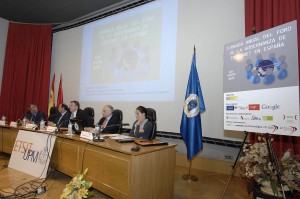On 12th May the IGF Spain´s annual conference took place in Madrid. This event is the main platform for debate among all stakeholders on Internet Governance in Spain and provides a way for all interested parties to exchange views. This year it focused on public policy issues in relation to the sustainability and robustness of the Internet.
Nearly fifty panellists discussed in various debates and always interactive with the rest of the audience some of the present challenges regarding the future of the Internet, to just name a few
- The Right to be forgotten in Internet
- Internet Fundamental Rights
- Challenges of IPv6
- Net Neutrality
- Open government and public access to information
The program was divided into nine sessions to discuss and as far as possible also reach conclusions to propose the rules and governance of the Internet in each issue. All findings will be included by the IGF Spain in a document and will be distributed at national and international level.
However, some ideas can already be outlined here:
- In relation to Net Neutrality, there seems to be still confusion about its exact meaning and scope, although there is broad consensus for the need of a sustainable internet. The debate now is on how to get such sustainability – from a business and technical view – as the growth of data traffic is exploding, mainly due to the video. As also described in a recent post of Carlos Lopez Blanco, this threatens the current business model of several key players and thus the viability of the internet development, especially on mobile networks. It was also clear from the debate that there is a degree of consensus on basic “net principles” such as the free access to contents, transparency and the need to manage the network, although there is still sometimes disagreement on how exactly this should be done
- IPv6 is coming a reality and there was agreement that the new Internet protocol will facilitate innovation and increase possibilities for new applications on the Internet. Despite the fact that IANA has no more IPv4 addresses to distribute, current and future users will be able to use the internet as usual, because dual networks (which can handle both standards) will continue to exist for many years, until the new protocol will be fully implemented.
- An interesting debate arose around the issue of “Fundamental rights in the Internet”. A bit surprisingly, the outcome of the workshop was a clear “NO”: there is no need for internet-related rights. Why is that? Well, the real need would be to translate and adapt the real, the “analogue” world to the digital Internet. The main issue of the Internet however is that there are problems due to the lack of an international jurisdiction. This problem can not be solved following just the analogue world schemes, but most probably through new mechanisms like private contracts between parties. The need to solve the problem of a “digital identity” in the Internet was expressed by various speakers and it was recognised that anonymity in the Internet should be the exception and not the norm. The idea of translating the fundamental right of life to a “right for Internet access” was suggested and got some support from the audience.
- The Right to be forgotten was in the centre of another interesting debate. It was agreed that this is a right that should be exercised…. but no one knows really how! As in other cases, there are problems of jurisdiction and collision of different rights and also interests. A nice metaphor used was that Internet is very much like a tattoo: it could be very nice and trendy today, but what will happen in some years when I do not like it anymore? One can delete it, but you will always keep a scar. Internet and the searching engines are fantastic, but they also have the effect of bringing to surface which would otherwise maybe already forgotten. Are there legal solutions to this? Probably, but they will always lack behind the technology and new possibilities. Is in this area maybe more could be done, e.g. by using “robots” that can exclude some contents from search engines when a certain expiration date is reached. But what will the “rules” these robots need to follow?
- In the security debate the need to early detection and information to the users was underlined. Cyber-fraud is more and more organized and there is a clear value chain on the “dark side”. Here again there is a big problem of jurisdiction derived from the lost concept of national sovereignty in the Internet. Counter-attacks to cyber-delinquents must be fast and legal frameworks don’t make it easy. As one participant put it well: In this city of no-laws on the Net, technical solutions don’t understand laws nor frontiers.
Overall the conference had some very rich and interesting debates and created much “food for thought”!
Our thanks go to all organisers, especially Prof. Jorge Perez and his team from the “Escuela Tecnica Superior de Ingenieros de Telecomunicaciones de Madrid”, but also to all sponsors, including the Telefónica Foundation.








